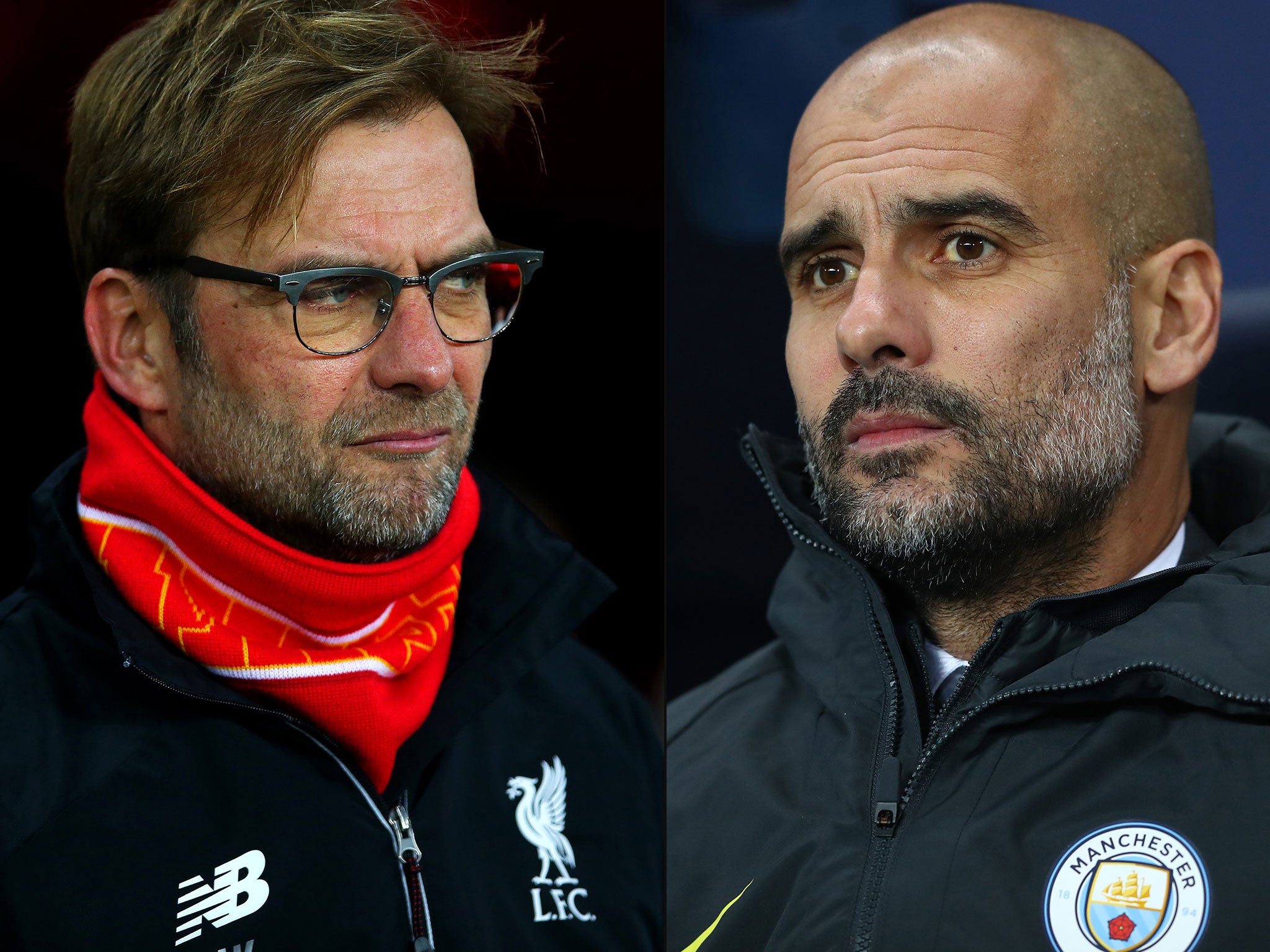Liverpool vs Manchester City: Pep Guardiola must adapt to Jurgen Klopp's 'heavy metal football' - or risk defeat
The onus, not for the first time, is on Guardiola to tweak his side's style of play. If the Catalan struggles to do so, City risk being swept aside at Anfield

“They are like a steamroller, unstoppable, and I have never seen anything like it,” said Pep Guardiola of Jurgen Klopp’s side. “They are completely focussed for 90 minutes, waiting for you to mess up a pass so they can set their sprinters on you.”
This was not Guardiola speaking yesterday at the City Football Academy in Manchester, although it sounds like a perfect description of Klopp’s Liverpool. This was Guardiola speaking on 24 November 2014, the day after his Bayern Munich team had beaten Klopp’s Borussia Dortmund 3-0 at the Westfalenstadion, after Guardiola’s changes turned the second half.
Despite that emphatic scoreline, Guardiola pledged to spend more time studying how Klopp’s Dortmund played in an attempt to overcome them. He knew that one win alone did not mean that he had cracked the code. “I must take some time to really study this,” he admitted, “and see if there is a way to stop them.”
If Guardiola sounded like he was on the defensive that is because he feared that Klopp’s teams could exploit a weakness in his own sides. While Guardiola's football is about dominating the ball and attacking expansively, Klopp football is about waiting for a mistake and pouncing with a ferocious counter-attack. It is football perfectly designed to expose teams that open themselves up.
That is why, despite that early triumph in November 2014, Guardiola and Klopp ended their two-year rivalry in Germany with honours even. It is a shame, looking back, that Guardiola’s Barcelona never met Klopp’s Dortmund between 2010 and 2012, for what would have been two very different teams near their peaks.
But before Klopp stepped down in the summer of 2015, he met Guardiola’s Bayern eight times, in the league, the cup and the super cup. It finished 4-4, with the fourth Dortmund win, in the semi-final of the 2015 cup, coming on penalties. Tomorrow’s game at Anfield will be their first meeting since.
The story of those eight games is that Guardiola needed to innovate to beat Klopp: even though Bayern dominated German football, winning the Bundesliga at a canter in 2013-14 and 2014-15; even though Bayern signed Mario Goetze from Dortmund in 2013, to Klopp’s fury, and then took Robert Lewandowski from them on a free transfer the following summer; even though financial muscle undermined the competitive balance of the Bundesliga in Guardiola's favour. Despite all this, Bayern were still vulnerable to Dortmund’s counter-attacking and Guardiola knew it.
That was the lesson of their first meeting in the Super Cup in July 2013, when Guardiola went for an open 4-2-4 system which Dortmund ran straight through, winning 4-2.
When they next met four months later Guardiola knew that he could play the same way and his team went to the Westfalenstadion determined to flood the midfield from the start. When he introduced Goetze and then Thiago in the second half he had so much quality in midfield that Bayern eventually swamped Dortmund and won 3-0.
But that win was followed by another bad defeat to Dortmund, suffering once again on the break. This meant that when the teams met in the 2014 German Cup final, Guardiola again had to find a new system. Their natural game was too vulnerable. So, as revealed in Marti Perarnau’s revelatory books about Guardiola, he went for a 3-6-1, realising that Dortmund liked to counter down the inside channels, rather than out wide. Those were the spaces Bayern had to shut down. It worked, with Bayern winning 2-0 in extra time.
Guardiola’s last big win against Klopp, in April 2015, again came with a 3-5-2 system which was compact, secure and restricted the space Dortmund could break into. They refused to open themselves up and that caught Dortmund by surprise. Bayern won 1-0.
The evidence of these eight games is that when Guardiola plays his natural game against Klopp, his teams are too open, leaving space for Klopp’s steamrollers to drive through. Only when he does something different, sitting further back, constricting the space, can his teams survive the onslaught.
What we have seen of Liverpool and Manchester City this season suggests that the same thing is true now, in England. Liverpool have mastered Klopp’s pressing and countering game almost as well as Borussia Dortmund did, although they clearly do not have as strong a defence. They are the highest scoring side in the country, and have scored four or more goals in one third of their league games so far.
City have been brilliant in flashes under Guardiola but have also shown that they are desperately vulnerable to pace on the break. That was the lesson of their second half collapse against Chelsea, when they conceded three teams, or their early meltdown at Leicester City, 3-0 down after 20 minutes.
If City play the same way at Anfield today, high, wide and open, then they will create the spaces that Klopp has taught Liverpool to attack into. But if Guardiola can find a Plan B to constrain Liverpool, then City surely have enough quality, with Sergio Aguero returning, to hurt Liverpool’s own vulnerable defence. The onus, not for the first time, is on Guardiola to adapt.
Subscribe to Independent Premium to bookmark this article
Want to bookmark your favourite articles and stories to read or reference later? Start your Independent Premium subscription today.

Join our commenting forum
Join thought-provoking conversations, follow other Independent readers and see their replies